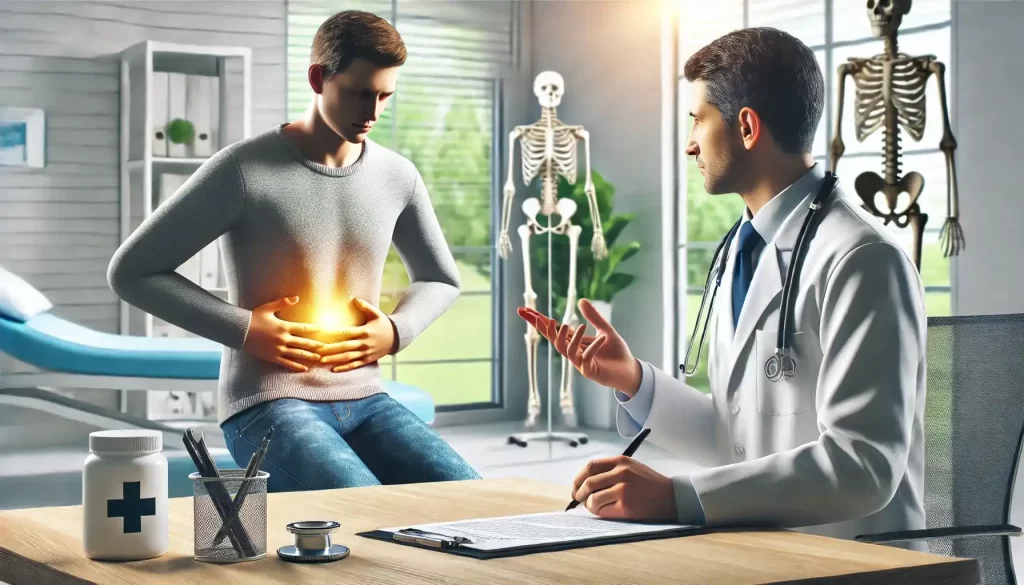Colon cancer, also known as colorectal cancer when it includes the rectum, is one of the most common forms of cancer worldwide. It typically develops from abnormal growths, called polyps, in the lining of the colon or rectum. While many polyps remain benign, some can become cancerous over time if left untreated. According to global health statistics, colon cancer is a leading cause of cancer-related deaths, but it is also highly treatable when detected in its early stages.
Early detection plays a pivotal role in improving survival rates and treatment outcomes. Symptoms of colon cancer can often be subtle or mistaken for less serious conditions, making it critical to recognize the warning signs. When caught early, treatments like surgery, chemotherapy, or targeted therapies are significantly more effective, and the chances of a full recovery are much higher.
In this article, we’ll explore the early signs and symptoms of colon cancer, discuss common risk factors, and outline the next steps for prevention and medical care. Understanding these signs and acting promptly could be lifesaving. Let’s dive into everything you need to know about colon cancer’s early indicators and how to take proactive steps to protect your health.
What is Colon Cancer?
Colon cancer, a type of cancer that begins in the large intestine (colon), is part of a broader category known as colorectal cancer. The colon is the final part of the digestive system, responsible for absorbing water and nutrients from food and storing waste before it is expelled. When abnormal growths, called polyps, form in the colon’s lining, they can sometimes develop into cancer over time.
Colon Cancer vs. Colorectal Cancer
The terms colon cancer and colorectal cancer are often used interchangeably, but they have distinct definitions:
- Colon Cancer: Refers specifically to cancers originating in the colon, the large intestine.
- Colorectal Cancer: Encompasses cancers of both the colon and the rectum, the final portion of the digestive tract.
Understanding this distinction is important for discussing symptoms, diagnosis, and treatment options, as rectal cancer may have slightly different manifestations or treatment protocols.
How Colon Cancer Develops and Spreads
Colon cancer typically begins when genetic mutations cause healthy cells in the colon lining to grow uncontrollably, forming a tumor. Most colon cancers start as adenomatous polyps, which are small, noncancerous clumps of cells. While not all polyps become cancerous, some can develop into cancer over time, especially if they are not detected and removed during routine screenings like a colonoscopy.
If untreated, colon cancer can grow and invade deeper layers of the colon wall. Over time, it may spread (metastasize) to nearby lymph nodes and other organs, such as the liver or lungs, making it more difficult to treat.
Key Risk Factors for Colon Cancer Development
Several factors can increase the likelihood of developing colon cancer, including:
- Age: Most cases occur in individuals aged 50 and older.
- Genetics: Family history or inherited conditions like Lynch Syndrome raise the risk.
- Lifestyle Choices: Diets high in red and processed meats, smoking, and physical inactivity contribute to colon cancer risk.
- Chronic Conditions: Inflammatory bowel diseases like Crohn’s disease or ulcerative colitis increase susceptibility.
Why Awareness Matters
Recognizing how colon cancer develops and understanding the difference between colon and colorectal cancer can empower individuals to seek regular screenings and make informed decisions about their health. Early detection is key to preventing the disease from progressing and spreading, significantly improving survival rates.
By knowing the basics of colon cancer, you can take proactive steps to reduce your risk and recognize potential symptoms early.
Why Recognizing Early Signs is Crucial
Early detection of colon cancer is one of the most important factors in successful treatment and long-term survival. Colon cancer often develops silently, with symptoms that may not appear until the disease has progressed to an advanced stage. Recognizing the early signs and symptoms of colon cancer can make the difference between a highly treatable condition and a life-threatening one.
Importance of Early Detection for Treatment Success
Colon cancer begins as small, precancerous growths called polyps in the lining of the colon. When detected early, these polyps can be removed before they become cancerous. Even if cancer has already developed, early detection typically means that it is still localized, making it easier to treat effectively with surgery, chemotherapy, or targeted therapies.
In the early stages, the survival rate for colon cancer is significantly higher. Early detection allows for less invasive treatments and greatly reduces the risk of cancer spreading to other organs, which can complicate treatment and reduce the likelihood of recovery.
Impact on Survival Rates When Caught Early
Colon cancer has some of the most promising survival rates when diagnosed in its initial stages. According to the American Cancer Society:
- The 5-year survival rate for localized colon cancer (cancer that hasn’t spread beyond the colon) is approximately 91%.
- When the cancer spreads to nearby lymph nodes, the survival rate drops to 72%.
- If the cancer metastasizes to distant organs, the 5-year survival rate falls to 14%.
These statistics highlight the critical importance of early detection, emphasizing the need to recognize warning signs and undergo regular screenings.
Role of Regular Screenings Like Colonoscopies
Screening tests play a pivotal role in identifying colon cancer early, often before symptoms appear. A colonoscopy is considered the gold standard for colon cancer detection because it allows doctors to:
- Identify and remove precancerous polyps during the same procedure.
- Diagnose colon cancer in its earliest, most treatable stages.
Other screening options include:
- Stool Tests: Detect blood or DNA changes linked to colon cancer.
- CT Colonography (Virtual Colonoscopy): A non-invasive imaging test to examine the colon.
For individuals at average risk, screenings typically begin at age 45. However, those with a family history or other risk factors should consult their doctor about starting earlier.

Early Signs and Symptoms of Colon Cancer
Recognizing the early signs and symptoms of colon cancer is vital for early diagnosis and effective treatment. Many of these symptoms are subtle and can be mistaken for less serious conditions, which is why paying close attention to changes in your body is crucial.
H3: Digestive Changes
One of the earliest indicators of colon cancer is persistent changes in your digestive habits. These may include:
- Persistent Constipation or Diarrhea: Prolonged alterations in bowel movements that don’t resolve with lifestyle changes or over-the-counter remedies.
- Narrow Stools: Stools that appear thinner or pencil-like can indicate a blockage in the colon.
- Changes in Bowel Habits: Alternating between diarrhea and constipation or increased frequency of bowel movements.
If these symptoms persist for several weeks, it’s essential to seek medical evaluation to rule out serious underlying conditions.
H3: Blood in Stool or Rectal Bleeding
- How to Identify Blood in Stool: Blood in the stool can appear bright red or dark and tarry, depending on where in the digestive tract the bleeding originates.
- When Rectal Bleeding Could Indicate Colon Cancer: Occasional bleeding can be caused by hemorrhoids, but persistent or unexplained rectal bleeding warrants immediate medical attention.
The presence of blood in stool is one of the most alarming signs and should not be ignored, even if it appears intermittently.
H3: Unexplained Abdominal Pain or Cramping
Colon cancer can cause chronic bloating, discomfort, or cramping in the abdominal area. These symptoms may:
- Worsen after meals or during bowel movements.
- Be accompanied by a sensation of incomplete bowel evacuation.
If abdominal pain becomes persistent or unusually intense, it’s a sign to consult a healthcare professional.
H3: Fatigue and Weakness
Colon cancer can lead to anemia, which occurs when the cancer causes chronic blood loss in the stool. Anemia reduces oxygen flow in the blood, resulting in:
- Persistent fatigue and low energy levels.
- A general feeling of weakness or being easily exhausted.
If you’re feeling fatigued without any clear explanation, it’s worth investigating further.
H3: Unexplained Weight Loss
Sudden, significant weight loss without changes in diet or exercise habits can be a symptom of colon cancer. This occurs because:
- Cancer cells consume energy, impacting your body’s metabolism.
- Advanced cases may obstruct digestion or nutrient absorption.
Unintended weight loss is a red flag that should prompt further medical investigation.
Risk Factors for Colon Cancer
Colon cancer doesn’t develop randomly; certain factors significantly increase the likelihood of developing this disease. Understanding these risk factors can empower you to make proactive choices and engage in preventive measures to protect your health.
Age and Family History as Primary Risk Factors
- Age: The risk of colon cancer increases significantly with age, with most diagnoses occurring in people aged 50 and older. However, recent studies show a worrying rise in cases among younger individuals, prompting discussions about earlier screenings.
- Family History: A family history of colon cancer or precancerous polyps can elevate your risk, especially if a close relative was diagnosed before the age of 60. This is often due to shared genetic factors and environmental influences.
- Inherited Conditions: Hereditary syndromes like Familial Adenomatous Polyposis (FAP) and Lynch Syndrome are strongly linked to colon cancer. Genetic testing can help identify these predispositions.
Role of Diet, Smoking, and Lifestyle in Increasing Risk
Lifestyle choices play a significant role in determining colorectal health. Factors that may increase your risk include:
- Diet: Consuming a diet high in red meats (like beef and pork) and processed meats (like hot dogs and bacon) has been linked to colon cancer. Conversely, a diet rich in fiber, fruits, and vegetables may reduce risk.
- Smoking: Long-term tobacco use not only harms the lungs but also increases the risk of colon cancer by exposing the colon lining to carcinogenic compounds.
- Alcohol Consumption: Excessive drinking is associated with an increased risk of colorectal cancer.
- Physical Inactivity: A sedentary lifestyle contributes to obesity, which is another recognized risk factor for colon cancer.
Preventive Tip: Incorporate at least 30 minutes of physical activity most days of the week to maintain a healthy weight and improve colon health.
Genetic Predispositions and Conditions like Lynch Syndrome
- Lynch Syndrome (Hereditary Non-Polyposis Colorectal Cancer – HNPCC): This inherited condition significantly increases the risk of colon and other cancers, often at a younger age than typical cases. Genetic counseling and regular screenings are crucial for individuals with Lynch Syndrome.
- FAP (Familial Adenomatous Polyposis): A rare condition in which hundreds of polyps form in the colon, dramatically raising the likelihood of cancer if untreated.
For individuals with a strong family history or a known genetic predisposition, screenings should begin earlier, and genetic counseling may be recommended.

When to See a Doctor
Being proactive about your health is critical when it comes to colon cancer. Certain symptoms and risk factors demand immediate medical attention, while routine screenings can help catch the disease in its early stages. Here’s what you need to know about seeking professional advice.
Symptoms That Warrant Immediate Medical Attention
If you experience any of the following symptoms, you should consult a doctor without delay:
- Persistent Changes in Bowel Habits: Such as diarrhea, constipation, or narrow stools that last for several weeks.
- Rectal Bleeding or Blood in Stool: Bright red blood or dark, tarry stools are signs that require evaluation.
- Abdominal Pain or Cramping: Unexplained discomfort, bloating, or cramping that doesn’t improve with over-the-counter treatments.
- Unintended Weight Loss: Sudden weight loss without changes in diet or activity levels.
- Chronic Fatigue or Weakness: Persistent tiredness, which could indicate anemia caused by internal bleeding.
These symptoms could indicate colon cancer or other serious health issues and should be investigated promptly.
Importance of Regular Check-Ups and Screenings
Routine screenings like colonoscopies are vital for detecting colon cancer before symptoms arise. They can identify precancerous polyps and early-stage cancers, significantly improving outcomes. Medical guidelines recommend:
- For Average Risk Individuals: Begin screening at age 45, with follow-ups every 10 years or as advised by your doctor.
- For High-Risk Individuals: Those with a family history, genetic predisposition, or chronic digestive conditions should start screenings earlier and more frequently.
Screening methods include:
- Colonoscopy: The most comprehensive screening tool, allowing for both detection and polyp removal.
- Stool-Based Tests: Detect hidden blood or DNA changes associated with colon cancer.
How to Advocate for Early Testing If You’re at Risk
If you believe you are at an increased risk due to symptoms, family history, or lifestyle factors:
- Be Honest with Your Doctor: Clearly describe your symptoms and any changes in your health.
- Know Your Family History: Share information about relatives who have had colon cancer or other related conditions.
- Ask About Early Screening Options: Advocate for tests like colonoscopies, even if you are younger than the typical screening age.
- Follow Up: If symptoms persist or worsen, don’t hesitate to seek a second opinion.
Key Takeaway
Recognizing when to see a doctor and understanding the importance of routine screenings can save lives. Don’t ignore persistent symptoms or hesitate to seek medical advice if something feels off. Early action is your best defense against colon cancer.
✨ [Visual Image Description]
The included image portrays a patient consulting a doctor in a modern medical office, emphasizing the importance of seeking timely medical attention. It highlights the professional relationship between patient and doctor, fostering trust and awareness of health concerns. ✨
Preventive Measures to Lower Your Risk
While some risk factors for colon cancer, such as age and genetics, are beyond your control, adopting certain preventive measures can significantly reduce your risk. By prioritizing a healthy lifestyle and staying proactive about your health, you can protect yourself against this potentially life-threatening disease.
Adopting a Fiber-Rich Diet
Diet plays a crucial role in maintaining colorectal health. A fiber-rich diet helps keep your digestive system functioning smoothly and reduces the risk of developing polyps, which can lead to colon cancer. Fiber adds bulk to your stool, promoting regular bowel movements and reducing exposure of the colon lining to harmful substances.
Tips for a Fiber-Rich Diet:
- Include plenty of fruits and vegetables, such as apples, berries, broccoli, and carrots.
- Add whole grains like oats, quinoa, and brown rice to your meals.
- Incorporate legumes such as lentils, chickpeas, and black beans for a high-fiber protein source.
- Limit your intake of processed foods and opt for natural, plant-based options.
Expert Tip: Aim for at least 25-30 grams of fiber per day for optimal digestive health.
Benefits of Regular Exercise and Avoiding Smoking
Physical activity and avoiding harmful habits are essential for reducing colon cancer risk and improving overall health.
- Regular Exercise:
- Engaging in moderate exercise for 30 minutes a day, five times a week can lower your risk by promoting a healthy weight and reducing inflammation.
- Activities like walking, cycling, swimming, or yoga can help regulate your digestion and reduce the likelihood of developing polyps.
- Avoid Smoking and Limit Alcohol Consumption:
- Smoking introduces carcinogens into your body that increase the likelihood of cancer development, including colon cancer.
- Excessive alcohol consumption has also been linked to colorectal cancer, so moderation is key. Stick to the recommended limits: up to one drink per day for women and two for men.
By making these lifestyle adjustments, you not only reduce cancer risk but also improve heart health, energy levels, and mental well-being.
Importance of Routine Colonoscopies and Early Screening
Screening is one of the most effective preventive measures against colon cancer. Routine colonoscopies allow doctors to detect and remove precancerous polyps before they develop into cancer.
Key Screening Guidelines:
- Begin routine screenings at age 45 if you are at average risk.
- Individuals with a family history of colon cancer or inherited conditions like Lynch Syndrome should start screening earlier.
- Other screening options include stool tests and CT colonography (virtual colonoscopy) for those unable to undergo traditional colonoscopy.
Regular screenings not only detect early-stage cancer but also reduce the overall incidence of colon cancer by identifying and addressing potential problems before they escalate.
The Bottom Line
Prevention is your most powerful tool in reducing colon cancer risk. By embracing a fiber-rich diet, maintaining an active lifestyle, avoiding harmful habits like smoking, and staying consistent with routine screenings, you can significantly lower your chances of developing colon cancer. Taking these proactive steps not only supports your digestive health but also enhances your overall quality of life. Make prevention a priority!
Conclusion
Colon cancer is a serious condition, but recognizing the early signs and symptoms and taking preventive steps can make a life-saving difference. From digestive changes and unexplained abdominal pain to fatigue and blood in the stool, understanding these warning signs can empower you to act early and seek medical attention when necessary.
Adopting a fiber-rich diet, maintaining regular physical activity, and avoiding smoking are crucial lifestyle changes that support colon health. Coupled with routine screenings, such as colonoscopies, these measures significantly reduce your risk and improve the likelihood of early detection and successful treatment.
Your health is in your hands, and small, proactive steps today can protect you in the future. Stay informed, prioritize routine check-ups, and don’t hesitate to consult your doctor if you notice persistent symptoms. Prevention and early detection are the keys to beating colon cancer. Take charge of your health—it could save your life.

